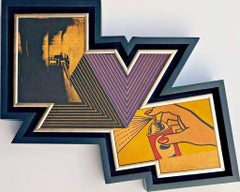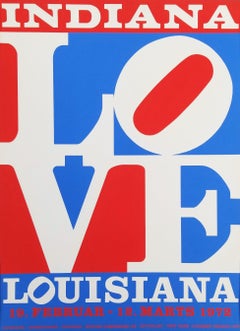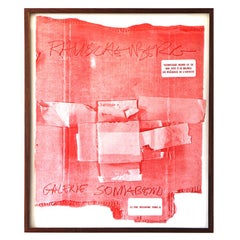Masonite Prints and Multiples
to
1
Overall Width
to
Overall Height
to
1
2
1
1
1
1
1
4
2
1
1
1
Artist: Richard Pettibone
Medium: Masonite
Richard Pettibone The Appropriation Warhol, Stella, Lichtenstein, Unique Signed
Located in New York, NY
Richard Pettibone
The Appropriation Print Andy Warhol, Frank Stella, Roy Lichtenstein, 1970
Silkscreen in colors on masonite board (unique variant on sculpted board)
Hand-signed by artist, Signed and dated on the front (see close up image)
Bespoke frame Included
This example of Pettibone's iconic Appropriation Print is silkscreened on masonite board rather than paper, giving it a different background hue, and enabling it work to be framed so uniquely.
The Appropriation print is one of the most coveted prints Pettibone ever created ; the regular edition is on a full sheet with white background; the present example was silkscreened on board, allowing it to be framed in 3-D. While we do not know how many examples of this graphic work Pettibone created, so far the present work is the only one example we have ever seen on the public market since 1970. (Other editions of The Appropriation Print have been printed on vellum, wove paper and pink and yellow paper.)
This 1970 homage to Andy Warhol, Frank Stella and Roy Lichtenstein exemplifies the type of artistic appropriation he was engaging in early on during the height of the Pop Art movement - long before more contemporary artists like Deborah Kass, Louise Lawler, etc. followed suit.
This silkscreen was in its original 1970 vintage period frame; a bespoke custom hand cut black wood outer frame was subsequently created especially to house the work, giving it a distinctive sculptural aesthetic.
Measurements:
Framed 14.5 inches vertical by 18 inches horizontal by 2 inches
Work
13 inches vertical by 16.5 inches horizontal
Richard Pettibone biography:
Richard Pettibone (American, b.1938) is one of the pioneering artists to use appropriation techniques. Pettibone was born in Los Angeles, and first worked with shadow boxes and assemblages, illustrating his interest in craft, construction, and working in miniature scales. In 1964, he created the first of his appropriated pieces, two tiny painted “replicas” of the iconic Campbell’s soup cans by Andy Warhol (American, 1928–1987). By 1965, he had created several “replicas” of paintings by American artists, such as Warhol, Roy Lichtenstein (1923–1997), Ed Ruscha (b.1937), and others, among them some of the biggest names in Pop Art. Pettibone chose to recreate the work of leading avant-garde artists whose careers were often centered on themes of replication themselves, further lending irony to his work. Pettibone also created both miniature and life-sized sculptural works, including an exact copy of Bicycle Wheel by Marcel Duchamp (French, 1887–1968), and in the 1980s, an entire series of sculptures of varying sizes replicating the most famous works of Constantin Brancusi (Romanian, 1876–1957). In more recent years, Pettibone has created paintings based on the covers of poetry books by Ezra Pound, as well as sculptures drawn from the grid compositions of Piet Mondrian (Dutch, 1872–1944). Pettibone straddles the lines of appropriation, Pop, and Conceptual Art, and has received critical attention for decades for the important questions his work raises about authorship, craftsmanship, and the original in art. His work has been exhibited at the Institute for Contemporary Art in Philadelphia, the Museum of Modern Art in New York, the Museum of Contemporary Art in Miami, and the Laguna Art Museum in Laguna Beach, CA. Pettibone is currently based in New York.
"I wished I had stuck with the idea of just painting the same
painting like the soup can and never painting another painting.
When someone wanted one, you would just do another one.
Does anybody do that now?"
Andy Warhol, 1981
Since the mid-1960s, Richard Pettibone has been making
hand-painted, small-scale copies of works by other artists — a
practice due to which he is best known as a precursor of appropriation art — and for a decade now, he has been revisiting subjects from across his career. In his latest exhibitions at
Castelli Gallery, Pettibone has been showing more of the “same”
paintings that had already been part of his 2005–6 museum retrospective,1
and also including “new” subject matter drawn from
his usual roster of European modernists and American postwar
artists. Art critic Kim Levin laid out some phases of the intricate spectrum from copies to repetitions in her review of the
Warhol-de Chirico showdown, a joint exhibition at the heyday
of appropriation art in the mid-1980s when Warhol’s appropriations of de Chirico’s work effectively revaluated “the grand
old auto-appropriator”.
Upon having counted well over a dozen
Disquieting Muses by de Chirico, Levin speculated: “Maybe he
kept doing them because no one got the point. Maybe he needed the money. Maybe he meant it when he said his technique
had improved, and traditional skills were what mattered.”
On
the other side, Warhol, in her eyes, was the “latter-day exemplar
of museless creativity”.
To Pettibone, traditional skills certainly
still matter, as he practices his contemporary version of museless creativity. He paints the same painting again and again,
no matter whether anybody shows an interest in it or not. His
work, of course, takes place well outside the historical framework of what Levin aptly referred to as the “modern/postmodern wrestling match”,
but neither was this exactly his match
to begin with.
Pettibone is one of appropriation art’s trailblazers, but his diverse
selection of sources removes from his work the critique of the
modernist myth of originality most commonly associated with
appropriation art in a narrow sense, as we see, for example, in
Sherrie Levine’s practice of re-photographing the work of Walker
Evans and Edward Weston. In particular, during his photorealist
phase of the 1970s, Pettibone’s sources ranged widely across
several art-historical periods. His appropriations of the 1980s
and 1990s spanned from Picasso etchings and Brancusi sculptures to Shaker furniture and even included Ezra Pound’s poetry.
Pettibone has professed outright admiration for his source artists, whose work he shrinks and tweaks to comic effect but, nevertheless, always treats with reverence and care. His response
to these artists is primarily on an aesthetic level, owing much
to the fact that his process relies on photographs. By the same
token, the aesthetic that attracts him is a graphic one that lends
itself to reproduction. Painstakingly copying other artists’ work by hand has been a way of making
it his own, yet each source is acknowledged in
his titles and, occasionally, in captions on white
margins that he leaves around the image as an
indication that the actual source is a photographic image. The enjoyment he receives in copying
is part of the motivation behind doing it, as is
the pleasure he receives from actually being with
the finished painting — a considerable private
dimension of his work. His copies are “handmade
readymades” that he meticulously paints in great quantities in his studio upstate in New York; the commitment
to manual labor and the time spent at material production has
become an increasingly important dimension of his recent work.
Pettibone operates at some remove from the contemporary art
scene, not only by staying put geographically, but also by refusing to recoup the simulated lack of originality through the
creation of a public persona.
In so doing, Pettibone takes a real
risk. He places himself in opposition to conceptualism, and he is
apprehensive of an understanding of art as the mere illustration
of an idea. His reading of Marcel Duchamp’s works as beautiful
is revealing about Pettibone’s priorities in this respect.
When
Pettibone, for aesthetic pleasure, paints Duchamp’s Poster for
the Third French Chess...
Category
1970s Pop Art Masonite Prints and Multiples
Materials
Masonite, Pencil, Screen
Related Items
Louisiana Museum of Modern Art (LOVE) Poster /// Robert Indiana Pop Art Blue Red
Located in Saint Augustine, FL
Artist: (after) Robert Indiana (American, 1928-2018)
Title: "Louisiana Museum of Modern Art (LOVE)"
Year: 1972 (First edition)
Medium: Original Screenprint, Exhibition Poster on heav...
Category
1970s Pop Art Masonite Prints and Multiples
Materials
Screen
$1,000
H 33.5 in W 24.5 in
Cardbirds, 1972 exhibition, rare original red poster, Robert RAUSCHENBERG
Located in Brooklyn, NY
Robert RAUSCHENBERG
Cardbirds, 1972 exhibition, rare original poster
For the exhibition "Cardbirds" at the Sonnabend Gallery
Signed in the plate framed in walnut.
21 x26.5" framed.
...
Category
1970s Pop Art Masonite Prints and Multiples
Materials
Screen
$1,000 Sale Price
60% Off
H 26 in W 21 in
Hero as a Riddle by Eduardo Paolozzi gold silver pop art with Basquiat style
Located in New York, NY
Hero as a Riddle (1963) depicts a smiling head printed in gold, silver, and black. The shapes and lines composing the figure’s face are architectural and geometric: the eyes are comp...
Category
1960s Pop Art Masonite Prints and Multiples
Materials
Screen
$2,650
H 39.5 in W 29.5 in
Tafel 16 by Eduardo Paolozzi colorful geometric collage pop art striped optical
Located in New York, NY
This Eduardo Paolozzi screenprint is composed with primary colors and black and white photographic imagery “collaged” in. Stripes and curvilinear forms merge in a vibrant exemplar of...
Category
1960s Pop Art Masonite Prints and Multiples
Materials
Screen
Hope - Progress, Pop Art Screenprint Diptych by Steven Gagnon
Located in Long Island City, NY
Two silkscreen prints by Steven Gagnon from 2011. Political commentary in pop art style imagery with a farcical tone. Unframed, hand signed in lower right corner.
Artist: Steven Ga...
Category
20th Century Pop Art Masonite Prints and Multiples
Materials
Screen
$5,000
H 29.5 in W 26 in
Polygon: Square (Four) /// Pop Art Robert Indiana Screenprint New York Numbers
Located in Saint Augustine, FL
Artist: Robert Indiana (American, 1928-2018)
Title: "Polygon: Square (Four)"
Portfolio: The American Dream
*Issued unsigned
Year: 1997
Medium: Original Screenprint on Coventry paper...
Category
1990s Pop Art Masonite Prints and Multiples
Materials
Screen
$800 Sale Price
33% Off
H 22 in W 16.63 in
I'll take my life monotonous from "Some Poems of Jules Laforgue" graphic pop art
Located in New York, NY
Printed in glossy purple, lavender, and bright yellow, I'll take my life monotonous by Patrick Caulfield depicts a lattice outlined in black, with three small dots of yellow. A garden lattice...
Category
Late 20th Century Pop Art Masonite Prints and Multiples
Materials
Screen
The Tel Aviv Peace (rare hand signed screen print)
Located in Aventura, FL
Screen print in colors on wove paper. Hand signed and dated lower right by Robert Indiana. Inscribed 'Shalom' and hand numbered 48/50 lower left. Sheet size 33 x 32.25 inches. Im...
Category
Early 2000s Pop Art Masonite Prints and Multiples
Materials
Paper, Screen
$6,000 Sale Price
20% Off
H 33 in W 32.25 in
LOVE (Plate 4) /// Pop Art Robert Indiana Screenprint Post-War New York Minimal
Located in Saint Augustine, FL
Artist: Robert Indiana (American, 1928-2018)
Title: "LOVE (Plate 4)"
Portfolio: Book of Love
*Signed and dated by Indiana in pencil lower right
Year: 1996
Medium: Original Screenprint on A.N.W. Crestwood Museum Edition paper
Limited edition: 75/200, (there were also 50 impressions in roman numerals)
Printer: Freeman Burks of American Image Editions, New York, NY
Publisher: Michael McKenzie of American Image Editions, New York, NY
Framing: Framed in a contemporary silver moulding and silver filet with white cotton rag matting
Framed size: 32.13" x 30.63"
Sheet size: 24" x 20"
Image size: 18.19" x 18"
Condition: Minor cosmetic wear to frame. In excellent condition
Notes:
Provenance: private collection - Cincinnati, OH. Numbered by Indiana in pencil lower left. Comes from Indiana's 1996 "Book of Love" portfolio of twelve screenprints of the same image in various colors, originally issued in a black-lettered brown paper-covered folio with accompanying twelve poems. Besides the Arabic and Roman numeral editions, there were also 15 artist's proofs. Technical Director: Peter Engert; Plate Maker: James Harvey; Counsel: Gregory S. Smith, Esq.; Fabricator: Al Hirshson; and Die Maker: York Display. Printed in three colors: white, gray, and dark gray.
The "Book of Love" project was conceived by the artist as a portfolio that would make a definitive statement on his masterpiece "LOVE", fulfilling his original vision as both a poet and a painter. The prints in the portfolio were created by Indiana as illustrations for his own love poems, written circa 1958-1973. The prints were produced in silkscreen using oil based paints on a newly created fine art paper that he found perfect for rendering "LOVE", which demands a precise line and radiant true color. The poems each have a highly raised embossment of "LOVE", trapped in colors, just below the title. Each print is hand pencil signed, and each poem hand pencil initialed by the artist.
Biography:
Robert Indiana was born on September 13, 1928 named Robert Clark in New Castle...
Category
1990s Pop Art Masonite Prints and Multiples
Materials
Screen
$12,000
H 32.13 in W 30.63 in
Keith Haring crawling baby Skateboard Deck (Keith Haring skate deck)
Located in NEW YORK, NY
Vintage Keith Haring Skateboard Deck featuring the artist's most recognized & iconic image, the Crawling Baby. This work originated circa 2013 as a result of the collaboration betwee...
Category
1980s Pop Art Masonite Prints and Multiples
Materials
Screen, Wood
Decade: Autoportrait '70 (Vinalhaven) /// Pop Art Robert Indiana Screenprint
Located in Saint Augustine, FL
Artist: Robert Indiana (American, 1928-2018)
Title: "Decade: Autoportrait '70 (Vinalhaven)"
Portfolio: Decade: Autoportraits, Vinalhaven Suite
*Signed and dated by Indiana in pencil ...
Category
1980s Pop Art Masonite Prints and Multiples
Materials
Screen
$3,000 Sale Price
40% Off
H 26.75 in W 26.75 in
Steve Kaufman "Abraham Lincoln" 1990 Artist Proof Serigraph, Hand Signed Verso
Located in Miami, FL
STEVE KAUFMAN – "ABRAHAM LINCOLN"
⚜ Serigraph on Canvas ⚜ Initialed Verso ⚜ Edition 48/50 AP ⚜ Black Float Frame
VIBRANT POP ICONOGRAPHY OF AN AMERICAN LEGEND
This bold 1990 serigra...
Category
1990s Pop Art Masonite Prints and Multiples
Materials
Screen, Canvas
$2,080 Sale Price
35% Off
H 19.5 in W 15.125 in D 2 in
Masonite prints and multiples for sale on 1stDibs.
Find a wide variety of authentic Masonite prints and multiples available on 1stDibs. While artists have worked in this medium across a range of time periods, art made with this material during the 21st Century is especially popular. If you’re looking to add prints and multiples created with this material to introduce a provocative pop of color and texture to an otherwise neutral space in your home, the works available on 1stDibs include elements of pink and other colors. There are many well-known artists whose body of work includes ceramic sculptures. Popular artists on 1stDibs associated with pieces like this include Enzio Wenk, Richard Anuszkiewicz, Fernando Botero, and Richard Pettibone. Frequently made by artists working in the Abstract, Modern, all of these pieces for sale are unique and many will draw the attention of guests in your home. Not every interior allows for large Masonite prints and multiples, so small editions measuring 0.01 inches across are also available
Recently Viewed
View AllMore Ways To Browse
Block Print Woman
Christo And Jeanne Claude Wrapped Trees
Dali Da Vinci
Dartmouth Winter Carnival Posters
Daude Pianos Poster
Eileen Mayo
Georg Gerster
Goldie Lipson
John Gallucci
Posters San Sebastian
Princesse Lointaine
Robert Indiana Love Is God
San Sebastian Poster
Shepherd Fairey
Terminator 1984
William Stilson
Adolphe Crespin
Alex Katz Black Dress


